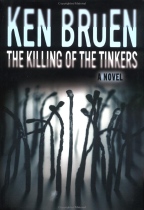The Killing of the Tinkers
Ken Bruen
St. Martin's/Minotaur
US Hardcover First
ISBN: 0-312-30411-0
224 Pages; $22.95
Publication Date: January, 2004
Date Reviewed: May 28, 2004
Reviewed by: Terry D'Auray © 2004

REFERENCES
COLUMNS
|
|
|
The Killing of the TinkersKen BruenSt. Martin's/MinotaurUS Hardcover FirstISBN: 0-312-30411-0224 Pages; $22.95Publication Date: January, 2004Date Reviewed: May 28, 2004Reviewed by: Terry D'Auray © 2004 |
|
|
REFERENCES |
COLUMNS |
Ken Bruen is an enigmatic writer with an original, mournful voice whose novels are powerful and perplexing, hard to like, but equally hard not to. Less a storyteller, more a poet, he chooses to write in the confines of the crime fiction genre, and then proceeds to ignore most all the rules. 'The Killing of the Tinkers' is Bruen's second book (following 'The Guards') featuring Jack Taylor, former Irish Guarda, a literary drunk, dissolute druggie, errant P.I., and profoundly sad and engaging lost soul.
At the end of 'The Guards', Taylor was newly sober, headed to London for a life reborn. In 'The Killing of the Tinkers', Taylor is back in Galway, knocking back Guinness, Jameson or any available alcohol, smoking, tooting lines of coke and reliving the failures of his past, all the while ensuring the flow of new failures to cloud his future. So much for rebirth. As in 'The Guards', the story begins when Sweeper, king of the local Gypsies (known as "Tinkers"), finds Taylor in a bar. If you're a client looking for Jack Taylor, P.I., best to begin your search in the bars. Sweeper wants to enlist Taylor to find the killer of a number of men in his Gypsy clan. Moved by the plight of the underdog Gypsy, the sight of a mound of cash, and the lack of anything else to do, Jack agrees to help.
Bruen's subsequent narrative storyline is but a convenient and often coincidental thread that weaves through what is essentially the continuing story of Jack Taylor and his demons. In Taylor, Bruen has created a unique Irish-brand of anti-hero, hopelessly dissolute and dejected, alternately enraged or engaged, often passed out in a drunken stupor. When conscious, Jack Taylor mirrors contemporary pop culture with a near obsessive devotion to music, song lyrics, movies and books. Especially books. One of Taylor's redeeming features from the viewpoint of an avid reader, and his one lifeline to redemption from the viewpoint of Taylor himself, is literature. He is a binge reader as well as a binge drinker, consuming quality writing when not consuming quality booze. General fiction, crime fiction and poetry; contemporary writers, historical writers. Sallis and Himes, Jim Thompson and David Peace, Frost, Whitman, Ginsberg, Anne Sexton. Taylor reads and relishes all with passion and Bruen's books are filled with references to authors and books and brimming with erudite opinions. Should someone ever compile a "Jack Taylor Recommends" list from Bruen's books, it would provide any reader with years of meaty and meaningful literary fare.
In both 'The Guards' and 'The Killing of the Tinkers', Taylor/Bruen frequently lauds George Pelecanos as "the best crime writer" (although his name is misspelled at least twice) and there are some compelling similarities between Bruen and Pelecanos as writers. Both mix contemporary music in their writing and use it to define their characters and to generate or sustain narrative atmosphere. Just as Pelecanos released his last novel with a CD, Bruen's novels could easily do with a soundtrack. Jack Taylor's drunken, guilt-laden dissolution mirrors that of Pelecanos's Nick Stephanos. Both writers are comfortably at home with the under classes - the odd, the offbeat, the outcast or the disenfranchised - and effectively write underclass characters with sensitivity, human dimension and embracing realism. Both Bruen and Pelecanos write prose that is lean, spare, powerful, and touched with poetry. Bruen easily trumps Pelecanos in the lean department however, omitting basic nouns, verbs and prepositions to cut his prose to the very bone. His novels are written dominantly in dialogue, either spoken or internal, with little exposition and n'er a flowery phrase, in simple sentences that convey complex sentiment.
What Bruen's Taylor novels lack, however, is a strong and consistent story - that set of events, occurrences and their consequences, actions and reactions, that define character and anchor structure. Bruen's action and violence unfold without context, and as a consequence, with diminished drama and diminished tension. Bruen leaves his story on the table like so much change on the bar. But if you can live without a story, you'll be rewarded with to-die-for noir poetry.